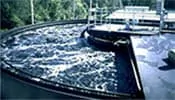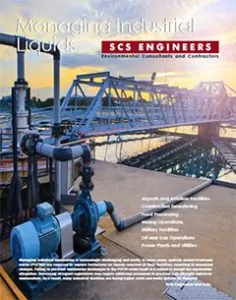


Stricter regulatory limits and increasing costs highlight the importance of having the right pretreatment system for your operations. SCS Engineers has a strong record of providing timely, appropriate, and cost-effective solutions for industrial wastewater pretreatment across a range of challenging contexts, including:
SCS handles complex projects, including developing pretreatment systems for fats, oils and grease, heavy metal removal, high-strength wastewaters, and mixed waste streams. Anaerobic membrane bioreactors (AnMBR) are used to treat high organic strength wastewaters and provide a revenue source as renewable energy for sale or help offset the cost of operations. In addition to improved digestion efficiency and enhancement in effluent quality, there are climate benefits. Anaerobic digestion can lower costs associated with waste remediation and benefit local economies.
These newer anaerobic digesters utilize membranes to concentrate anaerobic bacteria within the bioreactor while filtering the effluent to produce a high-quality effluent very low in total suspended solids. Digesters co-digesting manure with other feedstocks (e.g., fats, oils & grease, food wastes, plant wastes, manure) can increase biogas production. Co-digestion increases the amount of nutrients in the effluent, which means higher quality by-products such as fertilizers and high-BTU pipeline quality gas.
These facilities and projects require detailed technical and financial planning to be viable. Each facility has different business needs, so SCS offers individual and comprehensive design-build services and operations, maintenance, monitoring. SCS Energy experts (RNG, CNG, LNG) work with SCS Engineers’ liquids and wastewater management engineers to create higher efficiencies for more value. SCS Field Services Construction compliments these custom teams with decades of experience building lagoons, evaporation ponds, holding tanks, and piping for these plants.
Our National Experts are available to discuss technical design, economics, and operations that fit your business and environmental needs. We can help you with your industrial wastewater pretreatment challenges by:


Impact of Action Plans
With a growing list of chemicals and concentrations considered toxic, new water protection regulation, along with public fears of drinking water contamination, will drive the need for more effective pretreatment of wastewaters by industries and landfills. Many industries will feel the impact as the federal, state and local regulations determine what is permissible and enforced. The future regulations appear intended to foster wastewater reuse as a component of integrated water resource management.
EPA’s actions are part of a significant effort by the Administration to better coordinate and focus resources on the most challenging water resource concerns, including ensuring water availability and mitigating the risks associated with the potential for water scarcity. The EPA is working with the U.S. DOI and the USDA for a complete assessment of future water issues.
Per- and poly-fluoroalkyl substances, abbreviated as PFAS (e.g., Perfluorooctanoic Acid or PFOA, GenX compounds), are chemicals manufacturers use in many commercial products and processes. PFAS can be problematic when the chemicals present in wastewater eventually flow to a potable water utility or seep into groundwater. Analytical testing currently allows for detecting PFAS chemicals at very low limits because these chemicals have been shown to have health effects at low concentrations, and most PFAS do not easily break down. As such, PFAS are likely to be environmental and health concerns for years to come.
Suppose your facility detects PFAS levels that could cause a health risk, as dictated by local regulatory authorities or the USEPA. In that case, there are treatment technologies available that can remove the substances from wastewater. These include ion exchange processes, reverse osmosis, and others. Activated carbon can also remove PFAS contaminants.
Managing Waste Generated from Treatment Processes
Manufacturers and municipal wastewater treatment plants with sludge by-products will need to be aware of the concentrations of PFAS in effluents discharged to surface waters. In addition to ammonia, biochemical oxygen demand (BOD), total suspended solids (TSS), chemical oxygen demand (COD), pollutants such as chlorinated organic compounds, and now of growing concern: PFAS.
Known for the design-build of treatment systems, SCS Engineers puts our environmental engineers, scientists, and legal minds to work protecting your facilities. Our staff is actively involved with the ABA – American Bar Association’s Section of Environment, Energy, and Resources (SEER) group that stays on top of current developments in environmental, energy, and natural resources law that affects business. SCS staff and the firm are active members of the Solid Waste Association of North America (SWANA), the Water Environment Federation (WEF), the American Water Works Association (AWWA), and the Produced Water Society (PWS). SCS Engineers worked for and with the USEPA since its inception and with state environmental regulators in all 50 states. For clients with PFAS issues, SCS can:
SCS has been delivering industrial wastewater solutions for over ten years. We have developed excellent working relationships with regulators during this time, which contribute to the timely success of our clients’ projects. Our broad range of experience across many sectors means we can provide integrated solutions using the best and most cost-effective technologies and methods.